- Home
- Lauren Oliver
The Fearsome Firebird Page 7
The Fearsome Firebird Read online
Page 7
There was a new explosion of shouting and protestation. Speaking over the din, Schroeder continued: “You have the right to remain silent . . .”
“Remain silent!” General Farnum burst out. “I will not remain silent, sonny. You’re talking to a decorated war veteran, do you know that? It’s an outrage!”
“Mistake,” Betty said softly. “There must be a mistake.”
Schroeder went on, undeterred: “Anything you say may be used against you in a court of law. You have the right to an attorney. Should you be unable to afford one—”
At the mention of money, Cabillaud paled and made the sign of the cross.
“—one can and will be provided for you.”
Thomas watched it all with a growing sense of nausea. He felt as he sometimes did when he turned a corner in the city and could suddenly, miraculously predict what he would see, as though it had all happened to him before: a woman in a red coat walking a three-legged dog, a blind beggar with a tin cup and a cardboard sign pinned to his coat. Déjà vu—that’s what it was called.
But this déjà vu was all too real. Instantly, he was transported back to the spring, when Gilhooley and Schroeder had stormed the museum with handcuffs and accusations. That time, it was Mr. Dumfrey who had been arrested on suspicion of murder.
And Thomas knew in that moment that it wouldn’t end. They would always be harassed, accused, mistreated. The police would find any excuse to make their lives difficult, Hardaway and his group of mindless, suited-up zombies especially. Hardaway was furious at them for being different: he wanted them to pay.
“Gentlemen, gentlemen,” Mr. Dumfrey spoke up. “Let’s not rush to any hasty conclusions. General Farnum is an upstanding citizen and, as he mentioned to you, a veteran of the Spanish-American War, in which he served with great bravery and gumption.”
“Look at the man,” Danny said. When he was angry his Irish accent became more pronounced. “He’s ancient! He’s older than a tree stump and twice as useless. Takes him twenty minutes just to get on and off the kettle in the morning, if you catch my drift. He couldn’t have killed anyone.”
“Thank you, Daniel,” General Farnum said stiffly.
“Nice try,” Schroeder practically snarled. His eyes glinted. He had been trying to pin a bad reputation on the museum for months. This was obviously his big chance. “But we got eyewitnesses who say this creep”—he shoved General Farnum roughly toward the stairs—“was the last person going into Erskine’s place.”
“Witnesses?” Mr. Dumfrey huffed a laugh. “Louts! Liars! Lowly libelous frauds! We’ll have them brought up on charges! You should be arresting these so-called witnesses, not interrupting flea funerals—”
Gilhooley worked a long, skinny finger in his long, skinny ear and spoke for the first time. “Could you speak up, sir? I—I thought I just heard you say flea funeral.”
Mr. Dumfrey, who had never once turned down the occasion to give a monologue, barreled on, “—and beating down doors to harass perfectly innocent—”
“Wait,” General Farnum said, and Mr. Dumfrey abruptly shut up. It was something about the tone of Farnum’s voice. He appeared, far from hysterical, perfectly calm. But that was the terrible thing; he was like a man who, having driven off a cliff edge, relaxes on the plunge toward the rocks. “Wait,” he repeated. Even Schroeder released his grip on Farnum slightly, so he could at least straighten up, though he winced in his handcuffs as if they hurt. “Your witnesses weren’t lying. I did go to see that crook Erskine. I was worked up.”
“That’s enough, Farnum,” Danny growled. “Keep your mouth shut if you know what’s good for you.”
“That’s right.” Kestrel spoke up for the first time. His arms remained crossed. He was leaning against the kitchen door, his eyes still shaded by his hat. “These half-wits got nothing on you.”
At the same time, Lash said, “These numbskulls couldn’t pin a tail on a donkey.” For a second, the two men looked at each other, as if acknowledging the similarity of their thinking. Then they both looked away.
“I’ve got nothing to hide,” General Farnum insisted. He directed his words over his shoulder, toward the still-scowling Schroeder. “I did go and see Erskine, like I said. I was mad as a horned devil. But”—this as the babble of voices rose up again—“I never meant to hurt him. I only wanted to have a word about the fleas.”
Gilhooley scrubbed at his ear more vigorously. “Sorry,” he said, in response to Schroeder’s glare. “I keep thinking I hear the word fleas.”
“There are fleas and there are fleas, Sergeant,” General Farnum continued. “And my fleas were the special kind. I wanted him to ’fess up to what he’d done—a dastardly ambush when my boys were outflanked, outclassed, and outmaneuvered.”
There was a long pause. Schroeder stared at Farnum. Finally, Betty cleared her throat.
“He’d poisoned all the fleas,” she explained.
“Aha!” Schroeder cried. “I knew it. A motive!” and he seized Farnum by the wrists.
“No!” General Farnum protested, even as Schroeder propelled him up the stairs and to the street. “I swear on my stars, I never laid a hand on him! He was breathing when I left the building!”
“Save it for the judge, Farnum,” Schroeder said, even as they disappeared from view.
Gilhooley hesitated for just a second longer. He removed his hat from his head and pressed it to his chest. Even his hair, Thomas noticed, was long and lanky, like noodles plastered to his forehead.
“I’m, er, very sorry for your loss,” he said, and then, replacing his hat, scurried after his colleague.
For a long minute, no one said anything.
“Well.” Miss Fitch spoke first. She looked even more unhappy than usual, which—considering the fact that she had once actually modeled for the illustrated dictionary under the word displeasure—was saying a lot. “This is very unfortunate.”
“I knew no good could come of those fleas,” Danny said, stroking his smooth chin. “But did anyone listen?”
“He won’t go to prison, will he?” Goldini asked in a whisper. Goldini had a terrible fear of enclosed spaces ever since he had accidentally locked himself in a trick box for three whole days. They’d eventually been summoned by a furious banging and discovered he’d eaten an entire handkerchief for sustenance. “They won’t—lock him in a cell?”
“Now let’s not get our lasso in a loop,” Lash said decisively. “He’ll be out in a jiff, you’ll see.”
“Will he?” Betty shook her head. Her auburn hair glinted, halolike, in the setting sun. “You heard what Sergeant Schroeder said. He had motive and opportunity.”
“She’s right.” That was Kestrel, speaking up from his position by the door. “How do we know he didn’t do it, after all?”
“Now hold on.” Lash pointed a finger at Kestrel. In an instant, his face had darkened with fury. “General Farnum may be a lot of things, but one thing he’s not is any kind of murderer. Unlike some people I know.”
Although the sun was still shining, it was as though an enormous cloud had swept in overhead. Thomas half expected a clap of thunder to erupt over their heads, for sheets of rain to materialize from the blue sky.
Though Kestrel and Lash had finally quit glaring at each other, the sensation of cold discomfort stayed with Thomas. “It doesn’t matter whether General Farnum did it or not,” he said. “The police will do everything they can to pin it on him.”
“Enough.” Mr. Dumfrey held up a plump hand. “Enough,” he repeated, staring hard at Thomas when he began to protest. “The best offense is a good defense, as they say. I’ll just ring up my lawyer, Bill Barrister, and have him scoot down to the station—”
“I don’t think he’ll be of very much help in this instance,” Miss Fitch said. “Mr. Barrister died last January.”
“Dead,” Mr. Dumfrey repeated, stroking his chin. “No wonder he never answered my Christmas card. Is it too late to send flowers, do you think?”
&n
bsp; Miss Fitch inclined her head as if to say yes, it very much was too late.
Mr. Dumfrey exhaled loudly. “Well, no matter.” He squared his shoulders. “We’ll just have to find a new lawyer.”
“And pay him with what?” Monsieur Cabillaud huffed. “We can barely keep ze lights on!”
“I know a lawyer,” Betty said. “She’s very good. Remember the Romberger case? That German butcher shop owner, accused of bludgeoning his brother-in-law to death with a meat mallet? Everyone was convinced he was guilty until she proved it was the victim’s wife using a frozen leg of lamb.”
“She?” Mr. Dumfrey’s face darkened. “Wait a second. You’re not talking about—”
“ROSIE BICKERS!” Quinn and Caroline chorused together. “She’ll be perfect,” Quinn added.
“She’ll be brilliant,” Caroline chimed in.
“She’ll say yes,” Betty said gently.
“Absolutely not,” Mr. Dumfrey said firmly. “I refuse to go to that wretched woman. Do you know she once served me with a warrant? Andrea von Stikk tried to have me brought before the courts on a health department violation!”
“Oh, right,” Pippa said, making a face. “The Incident of the Three-Legged Chicken.”
“That stew was perfectly fine,” Dumfrey said irritably. “You’re still standing, aren’t you?”
“Come on, Mr. Dumfrey,” Pippa said. “Think of poor General Farnum.”
Mr. Dumfrey only scowled.
“Think of the fleas,” Sam added.
Mr. Dumfrey scowled deeper.
“It’ll be free publicity for the museum,” Betty pointed out. “Everyone loves reading about Rosie.”
The words free publicity acted on Mr. Dumfrey like a jumper cable to a lifeless battery. Instantly, his posture changed. He straightened his shoulders. He neatened his bow tie, which had begun to gravitate left. He cleared his throat.
“Well,” he said, with great dignity, “I suppose for the sake of our friend General Farnum, I can afford to let bygones be bygones. It’s settled, then. Rosie Bickers it is, first thing tomorrow!”
Rosie Bickers’s office was almost directly across town, on a bustling portion of Lexington Avenue just north of the Chrysler Building. Pippa, Max, Thomas, and Sam quickly volunteered to go with Mr. Dumfrey, and Max was relieved when he agreed.
They passed through Times Square, which even in early morning was flooded with tourists. Enormous billboards boasting Broadway’s Best Musical! and America’s Brightest Stars! loomed high overhead, eclipsing the sun and casting the streets in shadow, so Max felt almost like a bit of debris floating on a canyon river, tugged along by the current of the crowd. She was comfortable in the buzzing streets, happy to observe without being observed, as she had learned to do during her years on the streets.
Occasionally, she saw something that brought her back to those times: a familiar corner where she had occasionally swiped some oranges from a fruit seller; a beat cop who’d once chased her off the steps of a church; a palatial movie theater where she had occasionally stolen in to watch films for free and sneak bites of popcorn from the theatergoers sitting next to her.
Every so often she missed the freedom that came from belonging to no one—from being no one. But for the most part, her life on the streets already seemed vastly distant, as if it had happened to someone else. Mr. Dumfrey, the museum, Thomas and Sam and even Pippa—she belonged to them now and they belonged to her, and she wouldn’t have had it any other way.
“We’ll have to be sharp around Rosie,” Mr. Dumfrey said as they neared Fifth Avenue. “Made a name for herself as the best criminal defense lawyer this side of the Atlantic. Do you remember the Case of the Stinking Mackerel? No? Hmmm. You were too young, I suppose.” Mr. Dumfrey sighed. “I was a fan of Rosie’s, one of her first admirers—that is, until she threw in with Andrea von Stikk and tried to get me brought up on charges. Ah, here we are, 551 Lexington Avenue.”
Max was immediately disappointed. She’d imagined that the best criminal defense lawyer in New York City would have offices that reflected her reputation, in a gleaming skyscraper with marble floors and bodyguards flanking the entryway.
This was a dreary five-story building, its shabby exterior stained with soot. The lobby was narrow, dim, and musty-smelling, and a filthy carpet ran toward a single flight of stairs, at the top of which was a glass-paned door marked Bickers, Attorney at Law. Max squinted at the words written underneath the company name, puzzling them out slowly.
Criminal Investigations, Domestic Defense, and Private Security.
Then:
Hopeless Cases Welcome.
And finally:
No Solicitation, Suck-ups, or Silliness.
Max had a feeling she might like Rosie Bickers.
“Remember what I said about Rosie,” Mr. Dumfrey said in a whisper, touching his nose. “Keep your wits about you.”
Before he could knock on the door, however, it flew open, and a man came barreling out, forcing Mr. Dumfrey to take a quick step backward. His face was very red and his jacket was on in reverse, as though he’d been forced to put it on in haste. Even as he started down the stairs, an outraged female voice carried out into the hall.
“. . . And for the last time, if I ever see you in these offices again, I’ll take your tonsils out through your nostrils! I’ll snip your tongue with a pair of gardening shears! I’ll wear your eyeballs as earrings! I’ll—”
The door swung shut, swallowing the rest of her words. But almost immediately it opened again, revealing a short, squat, coarse-complexioned woman with a knot of frizzy dark hair, wearing a purple suit that made her resemble nothing so much as a very angry eggplant. She stopped abruptly in the midst of her monologue when she saw Mr. Dumfrey standing on the landing.
Instantly, her demeanor changed. She gave Mr. Dumfrey a toothy smile, stepped forward, and began vigorously pumping his hand.
“Ah, what a surprise. The great Mr. Dumfrey,” she said. Her accent was wide and flat and recalled the sailors who unloaded cargo at the Fulton Fish Market. This, too, was not what Max had expected. “I see you brought your little wonders with you, too.” Her eyes swept appraisingly over the small group. “Come on in, come on in. Sorry about the greeting. I was just having a friendly little chat with the tax man. Something tells me he won’t be bothering me again this year.” She let out a husky laugh.
“Miss Bickers,” Mr. Dumfrey said primly as she led them into her office—which, though very large, was just as dingy as the lobby had been, and filled everywhere with stacks of paperwork and overflowing files. In one corner, a secretary with the complexion of a dirty mop and blond hair pinned at the nape of her neck was doing her best to disappear into a typewriter. “You’re looking well.”
She waved a hand. “Save it, Mr. D. Or did you forget I can sniff out a lie like a bird dog on a duck hunt?” She had to shuffle past various file cabinets and an assorted miscellany of bewildering objects—a pair of crutches, an old-fashioned wicker baby carriage, an umbrella stand in the shape of an elephant’s foot, a suitcase plastered with stickers from Niagara Falls—just to get to her desk. She didn’t sit down, however. She just leaned over her desk to face them.
“So,” she said, her eyes gleaming. “What can I do you for?”
Mr. Dumfrey wasted no time. “You perhaps read about the murder of the unfortunate Ernie Erskine in this morning’s paper?”
“Hmmm. Was he the one found half-submerged in the East River, or the body chucked into a cement pourer? No—forgive me. He was the exterminator. Strangled in his office.”
“Correct,” Mr. Dumfrey said. “And unfortunately, our own General Farnum has been accused of doing the strangling.”
Rosie whistled and sat down in her chair. “Has he been arrested?” Mr. Dumfrey nodded. “Is there evidence against him?”
This time, Mr. Dumfrey hesitated. “Witnesses,” he said finally. “General Farnum went to visit Mr. Erskine and was apparently the last person to see him alive.�
��
“Except for his killer,” Max put in. Rosie raised an eyebrow at her, as though surprised that Max could speak.
“Except for his killer,” Mr. Dumfrey agreed.
Rosie whistled again.
“But,” Mr. Dumfrey hastened to add, “General Farnum couldn’t have killed him. Honor and duty. That’s what he lives for.”
“And fleas,” Thomas muttered.
“Mmm.” Rosie spread her palms wide. “What else?”
Mr. Dumfrey started. “What do you mean?”
Rosie leaned forward. “Let’s be frank with each other, Mr. Dumfrey,” she said. “I’m not one of the half-brained gidbits that wander into your museum, gaping and gawping over a fake mermaid or doctored photograph of an English garden gnome.”
“All of my natural specimens are one hundred percent authentic,” Mr. Dumfrey said stiffly.
Rosie raised her eyebrows but didn’t argue with him. “My point is,” she said. “We both know you’re here for one reason and one reason only. I take the hard-up cases. The hopeless cases, like it says on the door.” She leaned back in her chair. “So what else? The cops must have more ammunition than that.”
Mr. Dumfrey cleared his throat and tugged on his bow tie. “General Farnum and the dead man had a disagreement earlier that afternoon. The fight was witnessed by a sizable crowd.” Mr. Dumfrey looked deeply uncomfortable. Max didn’t blame him. Hearing the evidence out loud made General Farnum’s position seem much worse. “General Farnum was in an extreme state of emotional distress. He stomped off, swearing revenge.”
This time, Rosie didn’t whistle. She sat in moody silence, spinning a fountain pen on her desk. Finally, she roused herself. “I’ll take the case,” she said. Even as Mr. Dumfrey rushed to thank her, however, she cut him off. “But I’m warning you, I’m not a miracle worker. The truth is the truth. Not my fault if you don’t like it. But I’ll poke around a bit, see what I find out.”

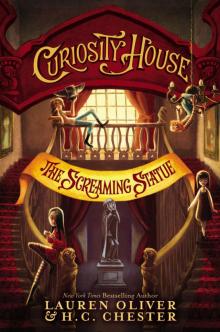 The Screaming Statue
The Screaming Statue Delirium
Delirium Before I Fall
Before I Fall Rooms
Rooms Replica
Replica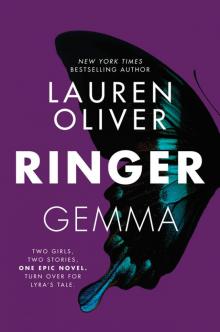 Ringer
Ringer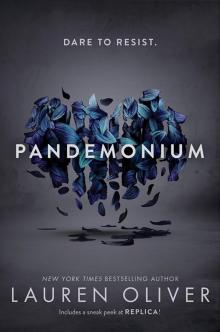 Pandemonium
Pandemonium The Shrunken Head
The Shrunken Head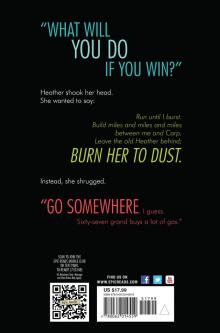 Panic
Panic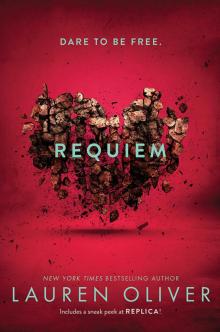 Requiem
Requiem The Spindlers
The Spindlers Annabel
Annabel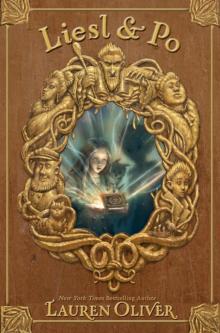 Liesl & Po
Liesl & Po Raven
Raven Alex
Alex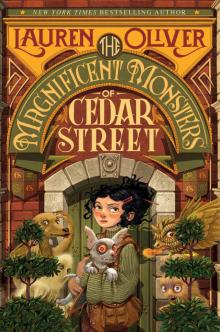 The Magnificent Monsters of Cedar Street
The Magnificent Monsters of Cedar Street Vanishing Girls
Vanishing Girls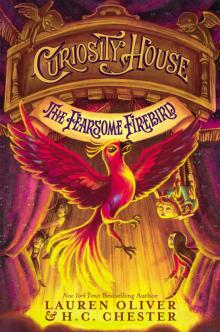 The Fearsome Firebird
The Fearsome Firebird Raven: A Delirium Short Story
Raven: A Delirium Short Story Annabel: A Delirium Short Story
Annabel: A Delirium Short Story Hana: A Delirium Short Story
Hana: A Delirium Short Story Broken Things
Broken Things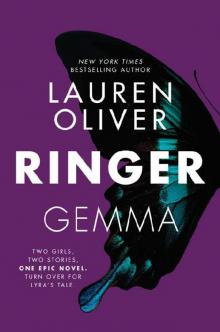 Ringer (Replica)
Ringer (Replica) Alex (delirium)
Alex (delirium)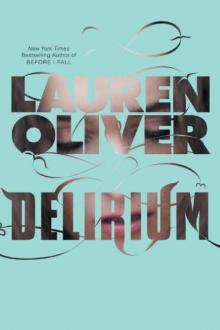 Delirium dt-1
Delirium dt-1